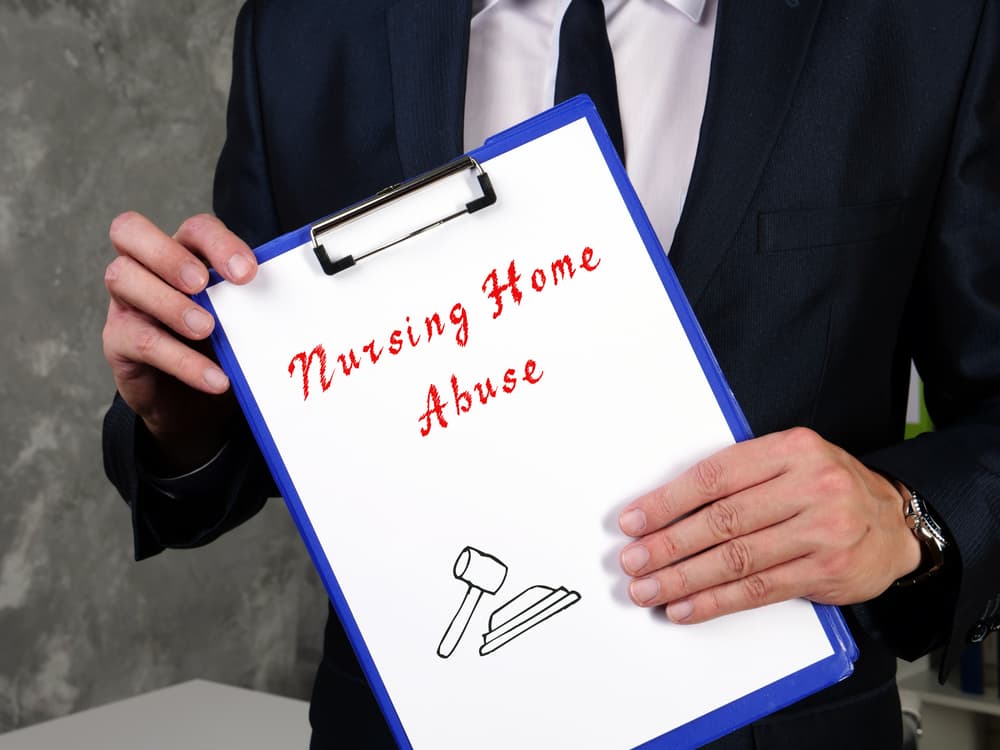Unfortunately, nursing home abuse continues to be a problem throughout the United States today. Although it is very difficult to gather reliable statistics concerning nationwide nursing home abuse, according to a study that the National Center on Elder Abuse sponsored, nearly 44 percent of residents at nursing homes have indicated that they were once abuse victims.
Abuse in nursing homes is not limited to physical abuse of residents. It can also involve financial abuse, emotional abuse, and mental abuse. However, physical abuse of a nursing home resident can lead to severe physical and emotional injuries.
If your loved one is the victim of abuse in a nursing home setting, then an experienced nursing home abuse and neglect attorney in your area can assist.
Your lawyer can promptly investigate the alleged abuse, review your legal options, and take the necessary action against the nursing home. That action may sometimes involve pursuing favorable settlement compensation on your loved one's behalf.
In contrast, at other times, it may involve litigating a case to a resolution in the court system. Your attorney can thoroughly review your options with you and select the option for your case.
Schedule a Free Initial Consultation Today!
Common Types of Nursing Home Abuse and Neglect
According to the National Center on Elder Abuse, nursing home abuse and neglect can take on a variety of forms.
Some common examples of abuse that may occur in a nursing home setting include:
- Drugging a nursing home patient or failing to properly monitor their medication
- Over-medicating or under-medicating a nursing home resident
- Neglecting a nursing home resident's needs, such as by failing to properly maintain, sanitize, and clean the nursing facility/room or failing to actively supervise and monitor nursing home residents
- Stealing money from a nursing home resident or engaging in other types of financial abuse
- Withholding food, water, or medication from a nursing home resident in retaliation for submitting a complaint against a nursing home employee
- Physically harming or attacking a nursing home resident
- Sexually abusing a nursing home resident
- Threatening a nursing home resident with physical harm
If you believe that your loved one may be the victim of one or more types of nursing home abuse/neglect, always take prompt legal action.
An attorney can investigate the circumstances of the alleged abuse and determine whether a single act or multiple acts of abuse may have occurred.
Your attorney can then file an appropriate claim with the nursing home's insurance company and pursue a favorable settlement award on your behalf.
Injuries that Can Result from Nursing Home Abuse or Neglect
When nursing home residents are victims of abuse or neglect, they may have very serious physical injuries and sometimes emotional trauma. Physical injuries that a nursing home abuse victim suffers will usually depend on the circumstances involved.
Common injuries may include broken bones (including broken hips), traumatic head and brain injuries, spinal cord injuries, paralysis injuries, open lacerations, and severe bruising.
Sometimes, nursing home employees treat residents poorly and engage in acts of emotional or even sexual abuse. In those instances, a nursing home patient may have severe mental trauma, including an inability to trust others.
A skilled nursing home abuse lawyer can immediately investigate the circumstances of alleged abuse and begin taking legal action on your behalf in pursuit of a favorable monetary settlement.
Legally Proving Nursing Home Abuse or Neglect
To recover monetary compensation and damages as part of a nursing home abuse or neglect claim, the nursing home patient – through their legal representative – will have to satisfy several legal elements of proof in their case.
The negligent or abusive nursing home or nursing home employee, on the other hand, does not need to satisfy any legal burden of proof or meet any legal elements.
First, the nursing home abuse victim must establish that the nursing facility and its employees owed a legal duty of reasonable care to the patient.
Doctors, nurses, nursing assistants, lab technicians, caregivers, and other nursing home employees, as well as the nursing home itself, have a duty to exercise reasonable care when treating patients and providing them with a safe place to live.
Part of this underlying duty of care involves:
- Providing patients with the proper medications in the proper dosages.
- Treating patients with respect.
- Providing patients with the medical care that they need.
- Properly cleaning and sanitizing the nursing facility.
Next, the nursing home abuse victim must demonstrate that the at-fault nursing home or employee violated their legal duty of care by acting unreasonably under the circumstances.
For example, a nursing home employee may have provided a patient with the incorrect medication or failed to monitor and supervise the patient properly.
In addition, the nursing home resident must establish that as a direct result of the nursing home or its employee's negligent behavior, an act of abuse or neglect occurred.
Finally, they must demonstrate that they suffered one or more illnesses or injuries as a direct result of the abuse or neglect.
When establishing the legal burden of proof in a nursing home abuse case, an experienced attorney can retain one or more experts who can testify in the case.
For example, a medical expert can testify that a nursing home employee administered the incorrect medication to a patient, resulting in serious illnesses, injuries, or medical complications.
An expert medical provider or other expert can also testify in support of the case at a deposition or civil jury trial.
A skilled nursing home abuse and neglect attorney in your jurisdiction can satisfy the legal elements of your claim so that you can recover favorable monetary compensation and damages.
Settling a Nursing Home Abuse or Neglect Claim
In some cases, a nursing home facility may admit fault or liability for the alleged act of neglect or abuse. If they do not admit fault, your attorney can begin an independent investigation into the situation and obtain evidence to see exactly what happened.
In some cases, especially when the nursing facility admits it did something wrong, the parties will reach a favorable settlement agreement. In that case, the matter will never go to court or trial. Some nursing facilities offer settlement compensation to avoid negative publicity, time, and expenses associated with prolonged litigation in the state court system.
A nursing home abuse and neglect attorney in your area can gather the documents necessary to satisfy your legal burden of proof. Your attorney can then submit those documents to the insurance company and begin pursuing the settlement compensation you need.
Documents that may be relevant to a nursing home abuse or neglect case include:
- Incident reports
- Photographs of visible injuries (such as from a fall)
- Medication records
- Related medical treatment records and bills
Once your attorney has submitted these documents to the insurance company adjuster handling your case, they may begin negotiating for the fair settlement compensation you deserve.
However, in many situations, negotiating with insurance companies is an uphill battle since insurance companies will do everything that they possibly can to undervalue a nursing home abuse or neglect case and avoid paying out significant monetary compensation to injury victims.
Insurance companies frequently use this approach to save money and keep their profits in-house.
A knowledgeable nursing home abuse and neglect attorney can be extremely helpful by aggressively advocating on your or your loved one's behalf. Your attorney can highlight the strengths of your case by pointing to pertinent evidence.
If necessary, your lawyer may also threaten the nursing home's insurance company with litigation in the court system if they refuse to offer you a fair settlement. Moreover, if litigation becomes necessary in your case, your attorney can promptly take the legal steps to file a lawsuit in the court system.
What Happens During Nursing Home Litigation?
Although prolonged nursing home litigation is not always the norm, it sometimes happens when injured patients and insurance companies cannot agree to resolve their cases out of court.
In that instance, your attorney may file a lawsuit on your behalf. Another attorney will enter an appearance on behalf of the nursing facility and the insurance company.
During litigation, the parties will take part in a process known as discovery. While the case is in the discovery phase of litigation, the parties will typically continue exchanging documents they may later use as evidence in their case.
Additionally, the parties will typically answer written questions, called Interrogatories. Your lawyer may also take the deposition of a nursing home facility representative, such as a manager or administrator.
After discovery, the parties will have a better idea of the strengths and weaknesses of each side’s case. They will likely attend one or more mediation sessions or settlement conferences with the court in an attempt to resolve the case. Many courts require parties to try to settle out of court before setting a trial date.
If your case does not resolve out of court, the parties may take it to a civil jury trial or binding arbitration proceeding.
During a civil jury trial, your attorney can aggressively argue on your behalf and introduce various types of evidence, including documentary evidence and testimony from expert witnesses. The jury who is listening to the case will then decide on the amount of financial compensation to award you for nursing home abuse or neglect.
Instead of taking your case to a civil jury trial, your attorney may pursue alternative dispute resolution (ADR), such as mediation or binding arbitration. For example, during a binding arbitration proceeding, the parties will present evidence in their case just as during a civil jury trial. However, a binding arbitration hearing takes place outside of a courtroom.
A neutral arbitrator (whom the parties preselect) will decide the issue of monetary damages in the case rather than a jury.
During a mediation session, a neutral mediator will listen to both parties’ positions in the case and help them focus (and hopefully narrow) their settlement discussions.
While some cases resolve at mediation sessions, others do not. If the nursing home abuse/neglect case does not resolve during mediation, the parties may schedule follow-up sessions in an attempt to favorably resolve their legal matter without going to court.
If the nursing facility's insurance company refuses to compensate you fairly for your injuries, your attorney can weigh litigation options and determine the best course of action for justice.
When you have a nursing home neglect or abuse case, your dedicated nursing home attorney will lead every aspect of your case. From conducting thorough investigations to negotiating with responsible parties, they protect your rights every step of the way.
You can trust that your case is in capable hands, and they'll work tirelessly to secure the justice and compensation you deserve.
Call a Nursing Home Abuse and Neglect Attorney in Your Area Today
If you or someone you love is the victim of nursing home abuse or neglect, you should consult an experienced attorney in your area as soon as possible. Ideally, you want a lawyer on your side who regularly handles nursing home abuse cases and who represents their clients in court instead of settling all of their cases out of court.
In a nursing home abuse or neglect case, an abuse victim must file a personal injury lawsuit within three years of the injury date.
Otherwise, they will forever waive their right to recover any monetary compensation for their losses. Therefore, time is of the essence in your case, and you need to retain skilled legal counsel to begin investigating your circumstances as quickly as possible.

In addition to investigating the circumstances of nursing home abuse and neglect, your attorney can handle every step of the claims-filing process, including gathering pertinent documents, submitting those documents to the insurance company, and pursuing favorable settlement compensation. Additionally, your attorney can file a lawsuit and litigate your case in the court system if necessary.
Whatever you decide, your Michigan personal injury lawyer will do everything they can to maximize your overall monetary award so that you become whole again, to the greatest extent possible, and obtain the justice you deserve.


